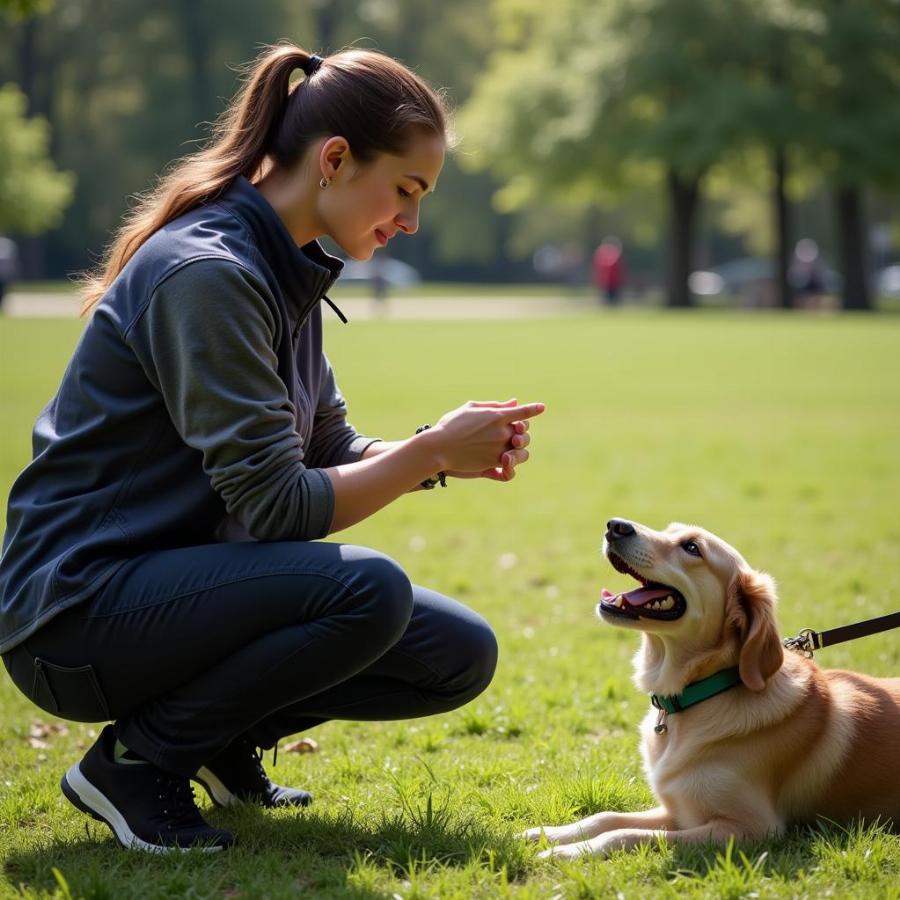When your beloved canine companion is bitten by another dog, it can be a frightening and stressful experience. Knowing what to do immediately after a dog bite and how to handle the situation can make a significant difference in your dog’s recovery and prevent future incidents. This comprehensive guide will provide you with essential information on how to care for your dog after a dog bite, covering everything from first aid to preventative measures.
Assessing the Damage After a Dog Bite
After a dog bite, the first step is to assess the severity of the injury. Check your dog for any visible wounds, bleeding, swelling, or limping. Even seemingly minor bites can hide underlying damage, so a thorough examination is crucial. If your dog seems to be in severe pain, is bleeding profusely, or exhibiting signs of shock, seek immediate veterinary attention.
First Aid for Dog Bites
If the bite is not severe, you can administer basic first aid while waiting for veterinary care. Gently clean the wound with warm water and mild soap, avoiding harsh chemicals or disinfectants that could irritate the injury. Apply pressure to stop any bleeding, using a clean cloth or gauze. Do not attempt to remove any embedded objects or close a deep wound yourself. These require professional veterinary intervention.
When to Seek Veterinary Care
my dog was bitten by another dog but no blood Even if the bite seems minor, it’s always best to consult a veterinarian. They can assess the wound for infection, prescribe necessary medications like antibiotics or pain relievers, and provide further guidance on wound care. Some bites may require stitches or drains, and your veterinarian can determine the best course of action.
Why is Veterinary Care Important?
Veterinary care is essential because dog bites can transmit diseases such as rabies. A veterinarian can assess the risk and administer appropriate vaccinations if needed. Moreover, they can identify and treat potential complications, such as abscesses or infections, ensuring your dog’s full recovery.
Preventing Future Dog Bites
Understanding the reasons behind dog bites can help prevent future incidents. Dogs may bite due to fear, territoriality, pain, or protective instincts. Proper socialization, training, and responsible pet ownership are key to preventing dog bites.
 Huấn luyện chó để tránh bị cắn
Huấn luyện chó để tránh bị cắn
my dog was bitten by another dog Avoid putting your dog in situations where they may feel threatened or uncomfortable. Keep them on a leash in public areas and supervise interactions with other dogs closely.
How can training help?
Training can teach your dog appropriate social skills and obedience, reducing the likelihood of aggressive behavior. Commands like “leave it” and “stay” can be invaluable in preventing potential conflicts with other dogs.
Legal Responsibilities After a Dog Bite
If your dog has been bitten by another dog, it’s important to exchange contact information with the other owner and report the incident to animal control. Depending on the severity of the bite and local laws, there may be legal implications, such as liability for veterinary bills or potential legal action. dog has been bitten by another dog Documenting the incident with photos and witness statements can be helpful.
Conclusion
Dealing with a dog bitten by another dog requires swift action and careful observation. By understanding the steps involved in first aid, veterinary care, and prevention, you can ensure your dog’s safety and well-being. Remember, seeking professional veterinary advice is always the best approach for ensuring a full recovery and minimizing potential complications. Don’t hesitate to contact your veterinarian if you have any concerns or questions after a dog bite incident.
FAQ
- What should I do if my dog bites another dog? Exchange contact information with the other owner, report the incident to animal control, and seek veterinary care for both dogs if necessary.
- Can I treat a dog bite at home? For minor bites, you can clean the wound with mild soap and water, but always consult a veterinarian for further guidance.
- How can I prevent my dog from biting other dogs? Proper socialization, training, and responsible pet ownership are crucial for preventing dog bites.
- What are the signs of infection in a dog bite? Signs of infection may include increased swelling, redness, pus, or a foul odor from the wound.
- Is rabies a concern after a dog bite? Yes, rabies can be transmitted through dog bites. Consult a veterinarian immediately for appropriate vaccinations and risk assessment.
- What are the legal implications of a dog bite? Depending on local laws, you may be liable for veterinary bills or other legal action if your dog bites another dog.
- How can I help my dog recover emotionally after being bitten? Provide a safe and comfortable environment, offer extra love and attention, and consider consulting a veterinarian or dog behaviorist if necessary.
Other Questions You Might Ask
- What are the common signs of pain in dogs after a bite?
- How long does it take for a dog bite wound to heal?
Beaut Dogs is your trusted source for all things related to dog care. We provide comprehensive information and expert advice on dog breeds, health, training, and nutrition. If you need further assistance or have specific questions about dog bites, please contact us at Email: [email protected] for detailed and accurate information. Beaut Dogs is committed to helping you provide the best care for your canine companion.